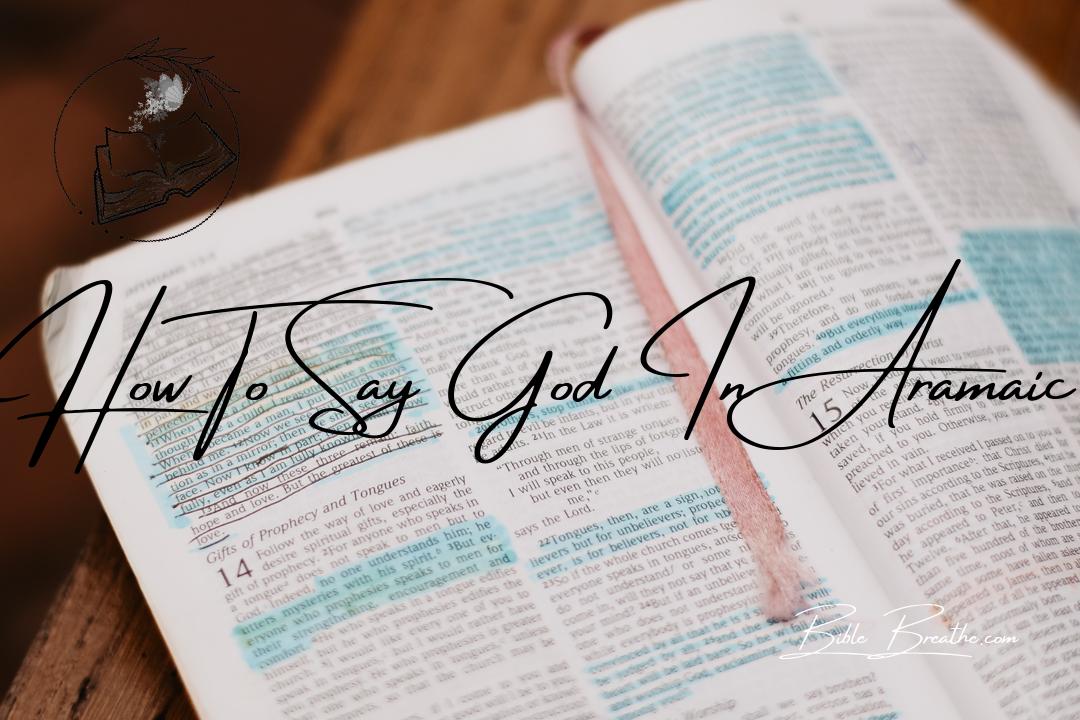Allah is not in the bible and Yahwah is not in the Quran.
Alla / Allah / Alilah = The god ascends. Referring to the rising Sun. Mohammad did not know the name of God, so he used the name of a Pagan god.
Yahuah / Yahwah = Life Began.
- Sorry, Alaha is the Aramaic word for God!
- It is not Allah!
- You get the link about the Aramaic Bible!
- Then you should check on the internet and not on what you know or don't!
Answer: The Arabic word for God is Allah. Aloho is the Syriac cognate, while Alaha is the Aramaic cognate, Hebrew is Eloah. These are all Semitic languages and are all related. The entomology for Allah is thought to be from Al combined with Ilah literally meaning The God. Hence, the Arabic word...

www.quora.com
Salwa Halabia
Syriac-Christian-Syrian and Eastern-European AmericanAuthor has 2.2K answers and 14.6M answer views
Updated 4y
The Arabic word for God is Allah. Aloho is the Syriac cognate, while Alaha is the Aramaic cognate, Hebrew is Eloah.
These are all Semitic languages and are all related.
The entomology for Allah is thought to be from Al combined with Ilah literally meaning The God. Hence, the Arabic word for God, Ilah, is equivalent to Elah/Eli in Aramaic, and Eloh/Eloi is Hebrew.
Learn the definition of 'Alaha'. Check out the pronunciation, synonyms and grammar. Browse the use examples 'Alaha' in the great English corpus.

glosbe.com
In an inscription of Christian martyrion dated back to 512, references to Allah can be found in both Arabic and Aramaic, which called him "Allah" and "
Alaha", and the inscription starts with the statement "By the Help of Allah".
WikiMatrix
The Aramaic word for "God" in the language of Assyrian Christians is ʼĔlāhā, or
Alaha.
WikiMatrix
16 Ahha (Ahhi) (410–414 AD) 17 Yahballaha I (Yab-
Alaha I) (415–420 AD) 18 Maʿna (Maana) (420 AD) 19 Farbokht (Frabokht) (421 AD) 20 Dadishoʿ (Dadishu I) 421–456 AD) With Dadisho, the significant disagreement on the dates of the Catholicoi in the sources start to converge.
WikiMatrix
An exact cognate outside of Hebrew is found in Ugaritic ʾlhm, the family of El, the creator god and chief deity of the Canaanite pantheon, in Biblical Aramaic ʼĔlāhā and later Syriac
Alaha ("God"), and in Arabic ʾilāh ("god, deity") (or Allah as "The God").
WikiMatrix
∫ The Arabic word for God--Allah--or the Aramaic (Jesus' spoken language) word--
Alaha--form excellent mantric material.
ParaCrawl Corpus
Anime watch / necklace /
alahas
ParaCrawl Corpus
But seek first the Kingdom of
Alaha and his righteousness, and all these shall be added unto you.
ParaCrawl Corpus
But I say unto you, Swear not at all: not by heaven, for it is the throne of
Alaha; nor by earth, for it is the foot-stool beneath his feet; neither by Jerusalem, for it is the city of the great king.
ParaCrawl Corpus
Local Time:
Alaha, Djibouti
ParaCrawl Corpus
But he answered and said, "It is written that not by bread alone liveth the Son of Man, but by every word which proceedeth from the mouth of
Alaha."
ParaCrawl Corpus
Alaha, current weather conditions
ParaCrawl Corpus
Then the Accuser taketh him to the holy city, and caused him to stand on the pinnacle of the temple; and said unto him, "If the Son thou art of
Alaha, throw thyself down; for it is written that his angels he shall command concerning thee, and upon their hands they shall bear thee, that thou strike not against a stone thy foot."
ParaCrawl Corpus
You believe that there is one
Alaha; you do well; the demons also believe, and tremble.
ParaCrawl Corpus
And they came to Jerusalem. And Yeshu went into the temple of
Alaha, and began to cast forth those who sold and bought in the temple, and he overthrew the tables of the money-changers, and the seats of them who sold doves: and he would not suffer any man to carry goods through the temple.
ParaCrawl Corpus
But after Juchanon was delivered up, Yeshu came to Galilee (Galila), and proclaimed the announcement of the kingdom of
Alaha. And he said, "The time is complete; the kingdom of
Alaha cometh: repent, and believe the good news."
ParaCrawl Corpus
Alaha: Hourly weather forecast Later
ParaCrawl Corpus
And Yeshu said to them, "To you it is given to know the mystery of the Kingdom of
Alaha; but to those without every thing is in parables: that while seeing they may see, and not see; and while hearing they may hear, and not understand; lest they should be converted, and their sins be forgiven them."
ParaCrawl Corpus
But he turned, and, beholding his disciples, reprehended Shemun, and said, "Get thee behind me, Satan, for thou thinkest not that which is of
Alaha, but that which is of the sons of men."
ParaCrawl Corpus
How To Say God In Aramaic? Discovering 'God' in Aramaic. Uncover the Ancient Language's Term for God. Explore Linguistic and Spiritual Connections.

biblebreathe.com
Exploring Language: How To Say “God” In Aramaic
The term for “God” in Aramaic has a rich linguistic history. In
Aramaic, the word for God is “אלהא” (pronounced as “Elaha” or “Alaha”). This term is notable for its use in various religious and historical contexts, including in
the New Testament of
- the Bible.
- It is important to approach the interpretation of religious texts with contextual understanding. The use of “Elaha” in Aramaic scriptures, such as portions of the
Old Testament and the teachings of Jesus, underscores the linguistic diversity of the
- biblical world. It also highlights the interconnectedness of languages and the influence of Aramaic on the broader Semitic language family.
- Aramaic is part of the Semitic language group, which includes Hebrew and Arabic. These languages share common linguistic roots and have influenced one another over time. The use of “Elaha” in Aramaic, for instance, has parallels in the Hebrew term “Eloah” and the Arabic term “Allah,” all signifying the concept of God.
- Recognizing the linguistic and cultural nuances of religious texts enhances our understanding of the diverse ways in which people have expressed their faith and reverence for the divine across different languages and traditions. It underscores the richness of human spirituality and the common thread that unites people in their search for the divine.









